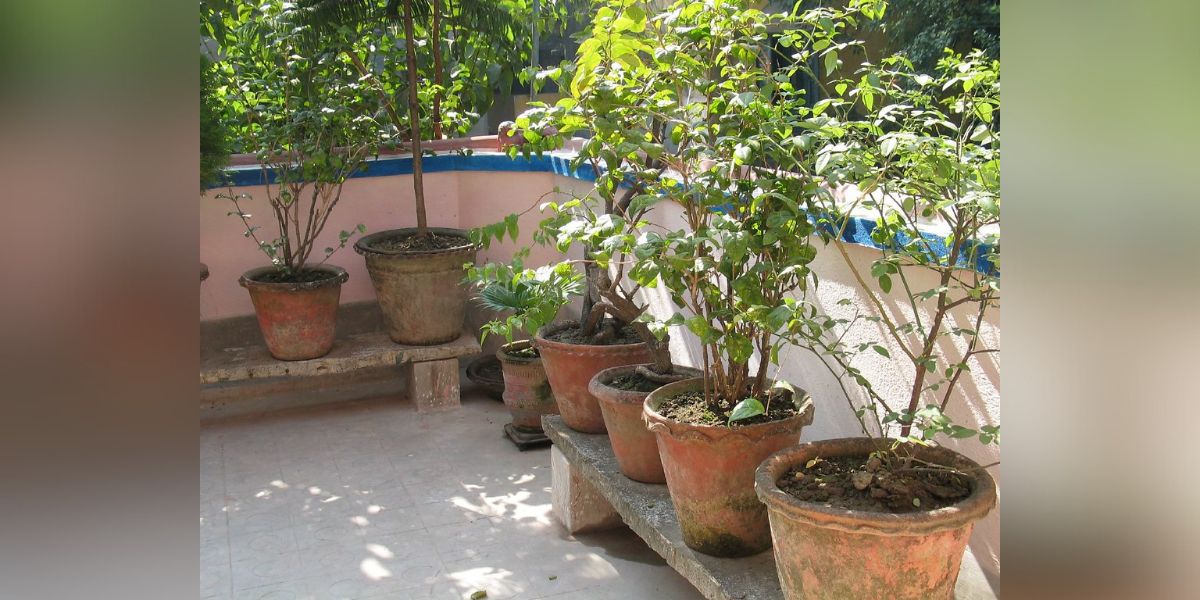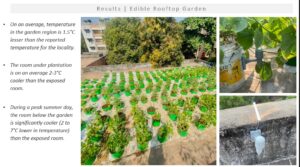Published Feb 23, 2025 | 7:00 AM ⚊ Updated Feb 23, 2025 | 7:00 AM

Potted plants at a terrace in Chennai.
Synopsis: Terrace farming is emerging as a sustainable and effective solution for Chennai residents looking to cool their homes, reduce waste, and grow their own food. For some, it’s a hobby; for others, it’s about growing their own food, and for a few, it’s a battle against climate change. However, there are also people who find terrace farming a difficult affair.
A silent green revolution is taking root in the urban landscape of Chennai in Tamil Nadu— one rooftop at a time. As climate change intensifies and urban heat levels rise, terrace farming is emerging as a sustainable and effective solution for residents looking to cool their homes, reduce waste, and grow their own food.
From researchers and homemakers to former corporate leaders, individuals across the city are turning their terraces into lush gardens, proving that urban farming is more than just a trend.
The Indian Council of Agricultural Research (ICAR) recognised urban agriculture as a crucial strategy to address the growing challenges of rapid urbanisation, food insecurity, and climate change.
South First spoke to several residents across Chennai to learn more about terrace farming and their reasons for engaging in it. For some, it’s a hobby; for others, it’s about growing their own food, and for a few, it’s a battle against climate change. However, there are also people who find terrace farming a difficult affair.
 Akshaya Ayyangar, senior research associate at the Chennai Resilience Centre, said that terrace gardening is not only an environmental solution but also a valuable educational tool.
Akshaya Ayyangar, senior research associate at the Chennai Resilience Centre, said that terrace gardening is not only an environmental solution but also a valuable educational tool.
“We primarily focus on kitchen gardening, but we are also deeply involved in gardening at a larger scale. Through our work in Anganwadis, we have observed how children benefit from understanding composting, waste segregation, and the natural growth cycle. It’s a circular process where we reap benefits in multiple ways,” Ayyangar said.
She cited a case study in Otteri where a terrace farming initiative significantly lowered indoor temperatures. “Upon comparison, homes practising terrace farming were nearly seven degrees cooler than those without it. That’s a remarkable impact in a city known for its sweltering heat,” she added.
For Srimati, a dedicated terrace farmer in North Chennai, gardening has been a way of life for the past decade.
“I started small, growing a few herbs in pots, but now my terrace is covered with spinach, tomatoes, and flowers that I use for poojas at home,” she said. Beyond food, Srimati practices upcycling, using plastic bottles and discarded containers as planters.
“I don’t throw anything away. If I can repurpose it for gardening, I will. I even make my own neem-based teeth-cleaning powder from the trees I grow on my terrace,” she said.
Virendra Mathur, a resident of Adyar and a former CEO of an IT company, finds terrace farming to be more than just a hobby — it’s a passion that transformed his life.
“The joy of planting, growing, and harvesting my own food is indescribable. It’s meditative, therapeutic, and it brings a deep sense of balance,” Mathur said. He has also gone beyond personal gardening and initiated composting in his residential welfare association (RWA).
“This initiative has multiple benefits, including waste reduction and better soil health. Since we started composting, our community has produced less waste and saved money on external waste disposal,” he noted.
Ramesh, a retired professor from Mylapore said, “I wake up every morning and check on my plants before anything else. There’s something incredibly fulfilling about watching them grow. It’s not just about the food—it’s about reconnecting with nature in the middle of a concrete jungle.”
Meenalini from Velachery said, “I never thought I’d be someone who grows their own vegetables but now, my entire family is involved. My kids love watering the plants, and my wife enjoys harvesting fresh greens for cooking. It’s become a family ritual that brings us together.”
Ravi an IT Professional from North Chennai said, “I admire those who maintain terrace gardens, but for me, it just seems like too much effort. Between work, home responsibilities, and commuting, I barely have time to cook, let alone grow my own food!”
Another resident from North Chennai said, “I tried terrace gardening for a while, but the upkeep was exhausting. Watering in the summer was a nightmare, and dealing with pests was another challenge. Eventually, I gave up — it just wasn’t practical for my lifestyle.”
Anand from T Nagar said, “I think it’s a fantastic initiative, but finding the time is difficult. I started with a few pots of herbs, but between my office hours and household chores, I just couldn’t keep up. Maybe once I retire, I’ll give it another shot.”
Rohini (name changed) from Anna Nagar said, “There’s a constant battle between passion and practicality. I love my little terrace garden, but after long work hours, I barely have the energy to maintain it. Some days, my plants suffer because of my schedule.”
Lakshmi, a college lecturer, “I see terrace gardening as an act of resistance against climate change. Instead of complaining about the heat, I decided to do something about it. My roof is full of plants now, and I’ve noticed a significant difference in my home’s temperature.”
“With Chennai’s heat levels rising every year, we need to start treating terrace gardening as a necessity, not a hobby. If every household had a few plants on their roof, imagine the difference it would make to the city’s overall temperature, she added.
Rajeswari, a homemaker said, “Groceries are expensive, and I don’t trust the quality of vegetables in the market anymore. Growing my own food gives me peace of mind — I know exactly what I’m eating, and I save money in the process.”
Vikram, another resident from Annanagar, “People think gardening is expensive, but it doesn’t have to be. I use old buckets, plastic bottles, and even broken furniture as planters. It’s about creativity, not cost.”
A study titled Urban Factors and the intensity of Heat Island in the City of Chennai by Monsingh David Devadas and Lilly Rose Amirtham, published in 2009 highlighted significant temperature variations between densely built-up areas and regions with more vegetation.
Their research, which analysed the intensity of the urban heat island (UHI) effect in Chennai, found that during the summer months, the mean maximum UHI intensity in the city reached 2.48°C, while in winter, it peaked at 3.35°C.
The study further emphasised that areas with dense greenery and open spaces experienced noticeably lower temperatures compared to highly urbanised zones dominated by concrete and asphalt.
Similarly, ICAR recognised urban agriculture as a crucial strategy to address the growing challenges of rapid urbanisation, food insecurity, and climate change.
In its reports, ICAR emphasised that urban farming is not merely a means of producing food within city limits but also a transformative practice that enhances sustainability in urban environments. By integrating green spaces into densely populated areas, urban farming helps mitigate pollution, improve air quality, and create a more balanced ecosystem.
Additionally, the practice encourages waste reduction through composting and organic farming techniques, leading to more efficient resource utilization. As cities continue to expand, ICAR suggested that adopting urban farming models — such as terrace gardening and community green spaces — can significantly alleviate the strain on traditional food supply chains while promoting environmental resilience.
(Edited by Muhammed Fazil.)

